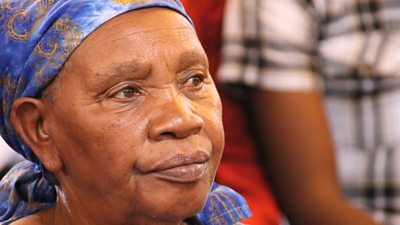Downloads
When you watch, it kind of inspires you to want to be like this other person… It makes you ask yourself: if this person is participating, why am I not participating?
Research summary exploring how Sema Kenya (Kenya Speaks) enables a national conversation about Kenya’s democratic processes, to support accountability and to increase people’s knowledge of key governance issues.
Publication date: March 2015
Summary
A survey carried out in July 2013 showed that people who regularly watched or listened to Sema Kenya reported greater knowledge of key governance issues than those who did not watch or listen to the programme. This was the case even when taking other factors into account.
The project
Sema Kenya is a national discussion programme which offers a platform for people in Kenya to ask their leaders about issues that affect them. It is funded by the UK’s Department for International Development and seeks to build trust in Kenya’s democratic processes by giving people trustworthy information and by improving their knowledge of governance-related issues including the new constitution and devolution.
The programme is shown on KBC TV (Kenya Broadcasting Corporation) as well as being broadcast by several radio stations across the country.
Research approach
A nationally representative midline survey of 3,006 people was conducted in July 2013.
Regression analysis was used to establish the association between listenership and levels of knowledge of key governance issues as well as political participation. This enabled us to understand this relationship while taking into account social and demographic factors that might have influenced respondents.
Key findings
- Sema Kenya audiences overwhelmingly agreed that it provides trustworthy (93% of audiences think so), accurate (89%), and useful (95%) information as well as discussing relevant topics (94%).
- Audiences regularly exposed to Sema Kenya were more likely to report that they knew a fair amount or a great deal about key governance issues that concerned them (73% of regular audience members compared with 42% of people who were not exposed to the programme).
- Regular listeners and viewers were significantly more likely to participate in politics frequently (34%) compared with those not exposed (21.5%). Political participation includes the following actions: attending a meeting in a local council or with other government officials, participating in an organised effort to solve a community problem, contacting an elected official and contacting a traditional chief or leader about an issue.
- Regression analysis showed that listening to Sema Kenya was significantly associated with higher levels of knowledge about Kenya’s devolution, security situation, the new constitution and unemployment even when taking into account the following factors: education, gender, age, location, purchasing power, media consumption, interest in politics and membership in organised community groups.
- However, regression analysis showed that exposure to Sema Kenya was not strongly associated with higher levels of participation. Overall, other factors such as education, gender, interest in politics, group membership and radio consumption were associated with higher levels of political participation.
Project context
After the post-election violence of 2007, efforts to address longstanding governance problems culminated in the adoption of a new constitution in August 2010. The constitution is expected to bring significant changes to Kenya, including greater political decentralisation. It is within this context that Sema Kenya was launched in October 2012.
The midline survey conducted in July 2013 showed that 23% of Kenyan adults aged 15 and above had listened to or watched Sema Kenya since its launch – an estimated 5.7 million people across the country. More than two million adults (9.2% of the Kenyan adult population) reported watching or listening to the programme regularly (at least every other episode).
Implications and impact
Regular exposure to Sema Kenya was significantly associated with higher levels of knowledge even when taking into account other factors such as education or interest in politics.
The analysis was not designed to attribute causality. However, at the mid-way point of the DFID-funded grant it is encouraging to see that our programme in Kenya was associated with higher levels of knowledge. Further research in other countries may support this evidence and will allow us to explore how programme formats and the wider country context affect ±«Óãtv Media Action’s ability to achieve its project-related governance objectives.
